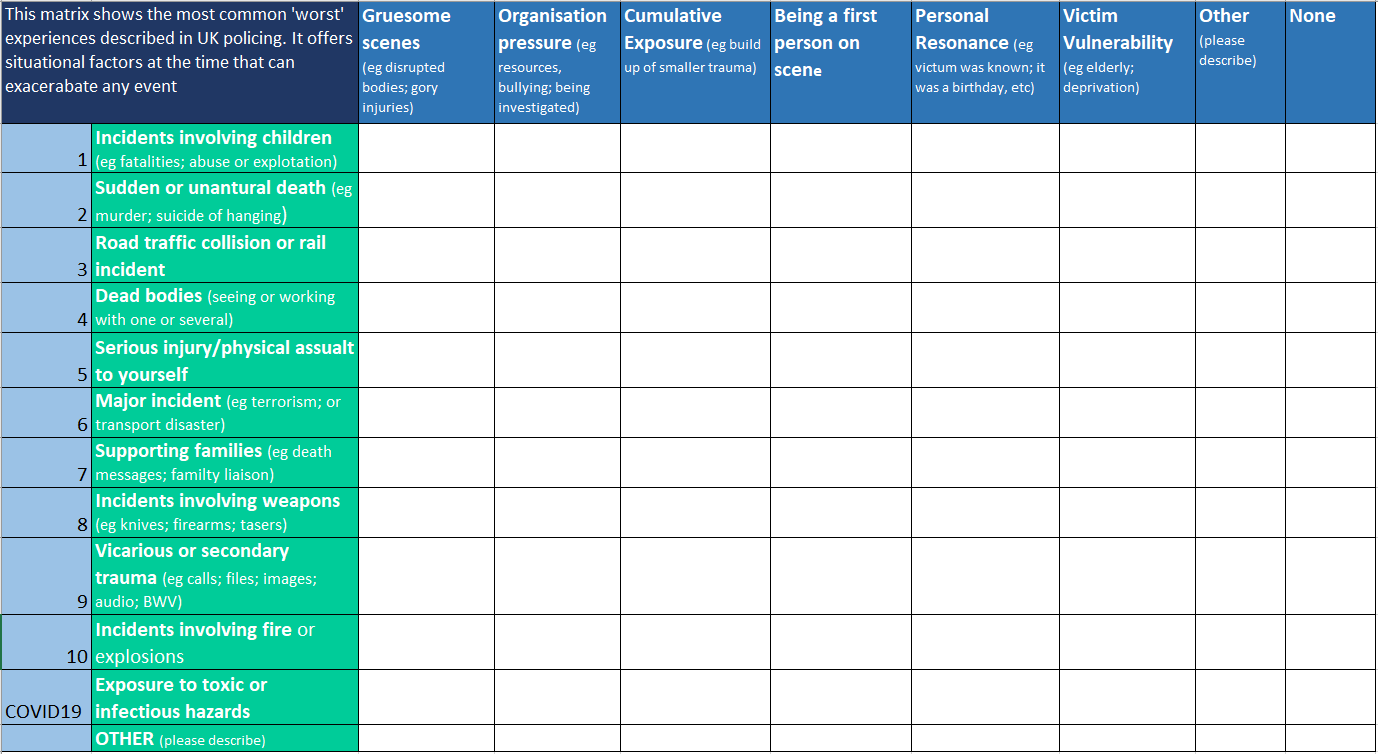The world’s first police specific traumatic events checklist, Police Traumatic Events Checklist, or PTEC, has been launched this month by Police Care UK after close work with the Police Federation of England and Wales, and the University of Cambridge.
Trauma exposure is an often-frequent part of everyday policing in the UK and has been for many years. It is recognised as posing a significant threat to wellbeing as its impact can be dramatic and long-lasting on police officers and police staff - in other words leaving many with some form of Post-Traumatic Stress Disorder. This can go on to affect an individual’s ability to carry out their job effectively and can have a significant impact on their personal lives too.
Despite this, there has previously never been a formal method of recording exposure to trauma, its frequency, or its severity, which gives headlines about looking after police officer’s welfare and calls to ‘protect the protectors’ a somewhat hollow ring. For this reason we have been campaigning to have a system such a PTEC initiated. It is our belief that by recording trauma incidents in such a way we can help members’ early capture and measuring of this cause of stress and ill-mental health and put mitigations in place before the impact becomes too significant.
The launch of PTEC gives any individual who wishes, the ability to tackle this very real threat to wellbeing and quantify trauma exposure. This is a voluntary means of recording trauma exposure and data, providing the ability to document what an individual is exposed to as part of their day job, and in-so-doing record their resilience and any change over time.
This can support career development, decisions on promotion, on the job training, attitudes towards general wellbeing and counselling, and can provide an early warning on wider stress levels.
The PFEW has worked closely with Dr Jess Miller, Police Care UK Director of Research, and the University of Cambridge, to code over 1500 of officers’ and staff’s worst reported incidents at work. This work was crucial to the development of a comprehensive checklist to describe and record experiences of everyday trauma. Using police-specific items that describe incidents and jobs known to be traumatic in the main ( child fatalities for example), along with situational components which may compound trauma (being first on scene is one example), the checklist can be used by any individuals in any role, who want to self-check their exposure.
As part of the research an anonymous online trauma survey was conducted - over 18000 staff and officers responded, over 7000 in detail, revealing the serious and wide-ranging concerns that the subject carries.
Leading several trials across different forces and ensuring responsible peer review in 2021, Police Care UK made PTEC freely available to all forces across the UK in September 2023.
PTEC has been developed in such a way that it can be used by individual officers, supervisors, team leaders, Occupational Health Practitioners, wellbeing leads, TRiM practitioners, federation or staff association representatives, counsellors and therapists, and even in force control rooms to monitor exposure levels with officers and staff and manage risk. This is a world first and with sufficient uptake can really impact decisions made around work for the better. Only by recording trauma in a specific and uniform way can its impact be understood, and actions taken accordingly.
Police Care UK CEO, Gill Scott-Moore says, “Since we first highlighted trauma exposure as an issue in 2016, Police Care UK have continued to research and develop innovative initiatives to tackle trauma exposure and resilience in UK policing. We are delighted that the Police Covenant is enabling a platform for these effective practices to be adopted by all forces and ensure we are helping to keep people well and meet the needs of modern-day policing.”
Police Care UK has provided comprehensive documentation on the use of PTEC, what it is, how to use it in different roles, case studies PTEC tools, so that an individual who wishes can look up and understand the practical application of PTEC whatever their role within policing; or alternatively guidance on how to integrate with existing force systems can be looked up.
We know that Sussex Police use PTEC to create an automated trauma tracker using Microsoft software integrated with their internal command and control system; and we know that Derbyshire Constabulary are in the process of developing a digital trauma tracker to be integrated into TRiM.
Sue Honeywill, Wellbeing lead for the PFEW commented, “I am really pleased to see the launch of PTEC. Anything that tracks the exposure and trauma our officers face is a positive step forward. We know that officers routinely deal with difficult and traumatic incidents on a regular basis but by using PTEC , there will be opportunities to record frequency and to identify any negative impact on an officers’ mental wellbeing and ensure supportive preventative measures are put in place.
We encourage all forces and Chiefs to review what preventative measures they have in place and promote the use of PTEC as a supportive tool to track the ongoing exposure to trauma faced by our officers.
With mental health absences increasing, forces need to ensure they can identify the right support for officers at the earliest opportunity and not wait till our officers' break. "
Now that PTEC is available PFEW calls on all Chief Constables to follow the lead set by forces such as Sussex and Derbyshire, and integrate PTEC into their internal systems so that exposure to trauma is tracked, quantified, recorded and responded to appropriately and action taken when it is needed and not after the fact.














